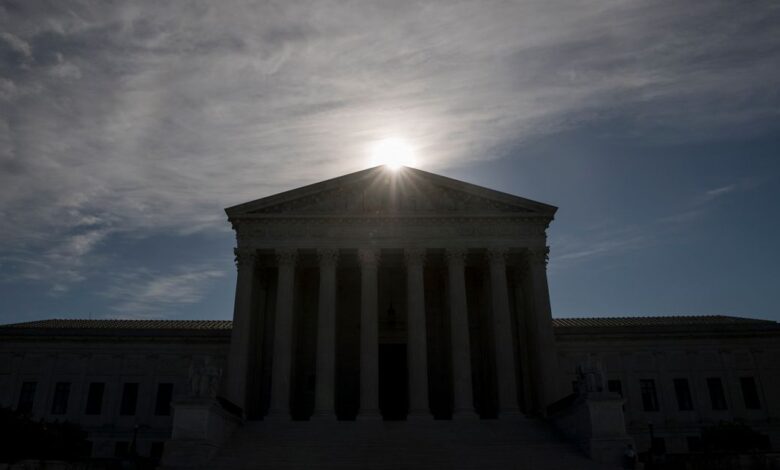Supreme Court Appears Divided In Critical Birth Control Case

The Supreme Court appeared divided Wednesday during arguments in a major case pitting women’s access to free contraceptive care against employers’ religious freedom claims.
At issue is a regulation under the Affordable Care Act that requires employer-provided health insurance to include coverage for birth control without a copay. This is the third time the contraceptive mandate has reached the Supreme Court, but the first since Justices Neil Gorsuch and Brett Kavanaugh joined the bench.
The current case centers on rules issued after President Donald Trump took office that would allow almost any employer to opt out of providing birth control coverage by citing religious or moral objections. Pennsylvania and New Jersey sued, and the rules were blocked by lower courts. The Trump administration and the Little Sisters of the Poor, an order of Catholic nuns, appealed.
The arguments in Trump v. Pennsylvania, consolidated in Little Sisters of the Poor v. Pennsylvania, was conducted via telephone conference and broadcast live due to the coronavirus pandemic.
Justice Ruth Bader Ginsburg participated from a hospital in Maryland where she is currently being treated for an infection caused by a gallstone.
Ginsburg said the Trump administration’s decision to weaken the order “throws into the air the entire teaching of Congress, that women need and should have continuous, cost-free, comprehensive coverage.”
Women have to find other ways to be covered, he added, and if they are not covered by a government program, to pay out of their own pocket for contraceptives.
That’s “exactly what Congress doesn’t want to happen,” he said.
But Kavanaugh, whose vote could be key in deciding the case, said, “There are very strong interests on both sides here, which makes the case difficult.”
“There’s religious freedom for the Little Sisters of the Poor and others, there’s an interest in ensuring women’s access to health care and preventive services, which is also a critical interest,” the conservative justice said. “So the question is, who decides how to balance those interests?”
The birth control mandate has been hotly litigated since its creation.
The Obama administration exempted houses of worship and provided a compromise for other religious nonprofits so they don’t have to offer coverage but employees can still get contraceptives. Under the accommodation, religious nonprofits notify their insurers of their objection and the insurers will provide contraceptive care. This accommodation was extended to some for-profit corporations as a result of a 2014 case, Burwell v. Hobby Lobby Stores.
But some religious objectors were not appeased by the compromise, arguing that even the step of notifying the insurer forced them to violate their beliefs.
Guidelines issued by the Trump administration in 2017 greatly expanded who can opt out of providing birth control coverage, and also made it optional for employers to provide accommodations for employees to access the birth control.
Much of Wednesday’s hearing centered on whether the Trump administration has the legal authority to expand the exemption under the ACA and another federal law, the Religious Freedom Restoration Act.
“What this case is about is not the resolution of a long-standing dispute, but rather the assertion of broad agency authority at the expense of Congress and the courts,” said Pennsylvania’s Chief Deputy Attorney General Michael Fischer.
US Solicitor General Noel Francisco, who argued on behalf of the Trump administration, said the exemptions were authorized under the ACA and the Religious Freedom Restoration Act, and were issued “in the best traditions of this country’s commitment to religious freedom .”
Some of the justices appeared frustrated that the two sides were unable to reach a compromise.
“Is there really no way to resolve those differences?” Chief Justice John Roberts asked at one point.
The last time the mandate was heard in court, in 2016, the magistrates sent it back to the lower court and urged the parties to seek resolution.
“Contraception is an essential part of health care. Its required coverage should not be lost at the whim of employers.”
– Kristyn Brandi, Physicians for Reproductive Health
Reproductive health experts oppose Trump’s rules and warn that allowing employers to deny coverage based on their personal beliefs would jeopardize important gains made under the Affordable Care Act.
Before the ACA, contraceptives accounted for about 30% of total women out-of-pocket health care costs, according to the National Women’s Law Center. In 2013, the mandate saved women more than $1.4 billion in out-of-pocket costs for birth control pills.
When cost is not a barrier to birth control, patients are better able to choose a method that meets their needs and have access to it consistently and affordably, says Kristyn Brandi, board chair of Physicians for Reproductive Health .
“Contraception is an important part of health care. Its necessary coverage should not be lost at the whim of employers,” he said. “It not only allows people to plan and time their pregnancies in the best way for their health and their families, but also help manage various health conditions.”
Almost all women use contraception at some point in their lives.
“It is deeply concerning that in the midst of a public health crisis, the Trump administration continues to defend a policy that threatens access to birth control for millions of women,” said Alexis McGill Johnson, acting who is president of the Planned Parenthood Action Fund. “This case highlights the lengths the administration will go to attack people’s fundamental right to control their own bodies, at a time when we should be coming together to support each other.”
A decision in the case is likely to come this summer.
A HuffPost Guide To The Coronavirus





